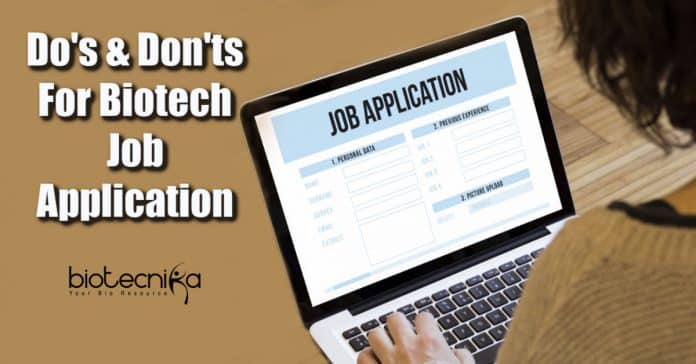Biotech Job Application: Do’s And Don’ts
Biotechnology is a fast-growing and widespread sector, and there are several job opportunities available. Every domain has competitors; the biotech industry also has a competitive job market and numerous candidates. For this, one must have a strong and compelling resume. One of the best ways to do this is to use resume samples highlighting the important parts and industry lingo that will impress employers.
The first and foremost thing is don’t rush writing your resume – Take an ample amount of time to compose your resume.
The biotech industry is abounding with opportunities to use a variety of skill sets; however, there prevail 2 main obstacles to overcome:
- Getting an interview opportunity for a job opening
- Assuring that you present yourself in the best possible way.
To help you get started, we have compiled Do’s and Don’t for a biotech job application.
Do’s: Tips to Improve Your Biotech Job Application
“There are many shortcuts to failure, but there are no shortcuts to true success.” In this section, we will discuss the outline of actions that will make your application process much smoother.
1. Tailor your resume
In the job searching stage, you may be
applying for positions in numerous organizations. That’s all right, yet take the effort to spend some time in your application for every company. Personalize your resume to the role and company you are applying for. Make certain that the skills listed in the job description are identifiable in your resume. The normal employer spends 6 seconds checking out each resume, so the more conveniently they can infer your qualifications, the more probable they are to move you ahead with your resume.Your resume should have a clear and compact layout and uniform formatting without distracting logo designs or unimportant details. If you have a lengthy listing of publications or volunteer work, pick the few works that are most suitable to the role or firm, and you can detail the remaining on your LinkedIn profile.
Let’s see few tips to compose your resume.
- Add Your Education At The Beginning – Add your education, professional training, Projects, and any additional industry credentials toward the top of your resume.
- Highlight Hands-On Experience – Include all the relevant experiential opportunities you have been a part of, like research, mentoring, leadership, teaching, and community or industry service.
- Point Out Your Scientific And Technical Proficiency – Discuss your specific fields of market expertise. Add specific expertise in techniques, tools, applications, and any technological abilities appropriate to the role you are applying for.
- Include your Soft Skills – Add about your skills in Communication, Research, Problem Solving/Troubleshooting, Organizing, Time Management, Business Strategy, Project Monitoring, People Management, and so on
- Highlight Your Achievements – Add your accomplishments from your graduation period or your previous job.
- Format For Submitting Your Resume – Send your resume in PDF format, as some systems will change the formatting for any other file extensions and make them illegible.
2. Include a cover letter
A cover letter also referred to as a covering letter or application letter is a single-page document that includes the candidates’ work history, professional skills, and personal interest in applying for a position.
A cover letter should be only a few paragraphs in size. You can describe any gaps in your work or reasoning behind a career change. It can be used to explain why you are a good fit for a particular job role.
Points to remember while writing your cover letter.
- Opening – Try to address your recruiter by his/her name. You may not know their name in many cases, but if you know it, don’t forget to address them by name.
- Reason for writing – Point out which position you wish to apply for, and add the reference of the person if someone referred you to the position.
- Introduce yourself – Give a brief intro about yourself and add your core proficiencies that show your positive side.
- Add Your education or work experience – Discuss a few of your previous works. If you don’t have any work experience, try to customize your educational qualifications according to the work requirement.
- How you are fit for this role – Include a few keywords associated with the work requirement. This area must link your CV/ Resume to the job requirement. You can also illuminate a few info not included in your CV/ Resume.
- Closing comments – Sum up how you can be an asset to the organization and end it by mentioning your availability for the Interview or further processes.
- Signing off – Sign off with your name and always mention your contact number below.
3. Research the company widely
Check out the website, know what services and products they are providing, know their mission and values, go through the posts about the company, and also try to find videos online of interviews. Don’t hesitate to ask your recruiter if you have any doubts.
What all should you know about the company?
- Understand the company’s challenges
- Understand the company’s competitors
- Understand the job description
- Know the skills and experience the company values
- Key players of the organization
- News and recent events about the employer
- The company’s culture, mission, and values
- Understand about the clients, products, and services
4. Be honest with the recruiter
A lot of applicants don’t discern that employers, specifically internal employers, are on your side. If they believe you have the ideal experience, they will certainly process your resume ahead. You should be honest regarding what kind of atmosphere you work best in, what kind of benefits are crucial to you, what you’re looking for in your next position and your salary requirements.
If you are honest, it’s simple to remember! If you misinform regarding your abilities, you might find yourself in an interview for which you are not certified, which is frightening as well as awkward. Be genuine and truthful, and you will make more development in your career gradually.
5. Ask about other related openings
Frequent blunder candidates make is not inquiring about various other openings within the company that could match their qualifications. Lots of firms have several recruiters that are all working on filling various positions. They will possibly have some info into what other ‘openings may be opening shortly. If you did not qualify for a certain position, do not hesitate to reach out to the recruiter and reveal your interest in other openings.
Dont’s: Mistakes to Dodge in Your Job Application
Most importantly, before you know what to do – You should be aware of what not to do! Let’s now discuss some mistakes that people make while writing a resume, which may negatively impact you.
1. Don’t apply to all openings
While it makes good sense to apply to many appropriate roles, the other extreme is a big NO. If an employer notices that you have actually applied on a big slate of unassociated positions, they are not likely to consider you for any of them. If a position is filled and reposted, don’t hesitate to re-apply, it can place your resume top of mind for a new hiring round; however, if the employer has already gone through your application and let you know that you were not the best fit, applying once again will generally get your resume archived.
2. Don’t be offensive
Communication is great; however, only in good measure. Do not constantly message a recruiting team, particularly if you have not applied through the website yet. In most cases, you can review your application status on the company website itself. However, after applying, you can follow up with the further process once you are selected.
3. Don’t ghost your employer
If you feel that the particular job position is not the right fit for you, or you might decide to take another offer or if you can’t make it for the scheduled interview due to any reason- let your employer know about this as soon as possible. Because taking candidates through the interview procedure takes a lot of time to organize. This little token of professionalism implies you won’t shed any bridges and might be considered for some other positions in the company.
4. Punctuality is pivotal
If you make it to the face-to-face interview – taking the schedule seriously will definitely put a great impression of yours. Generally, companies will ask you to reach half-hour earlier, giving them a lot of time to get you checked in and ready for the interview. Yet, this does not indicate you can reach the place slightly before that time. Keep in mind about the traffic and other things which can make you late. Always keep some buffer time. In the worst-case scenario, if you are not able to reach the office at the scheduled time, make sure you let the recruiter and/or coordinator know instantly so they can make changes in the interview schedule or let the interviewers know when to expect you and how much time they’ll have with you.
5. Don’t come unprepared
Preparation is a must – Whether you are interviewing over the phone or in-person! Be prepared with information about the company, examples of your experience for the position, and inquiries to ask that will help you know the job profile, team structure, growth possibilities, etc.
6. Don’t search for jobs outside your skill level
As mentioned above, don’t apply for every job you see. While applying for a job, read the job description and skills required thoroughly. If you don’t fit into the required category, don’t apply for that job, as it will definitely get rejected. Choose the job opening, which matches your education, skills, and experience.
7. Don’t blow the first impression
The first impression is always the best impression. And it is very difficult to erase off the negative impression. Your application must be proper – With all the required documents. And in the case of the interview, the way you present yourself matters a lot.
8. Don’t send your letter without proofreading
Once you are done with the application and resume, make sure you proof-read it to see if any errors are there. You can even ask someone else to check it for you. Make sure you have attached all the required documents.
Hopefully, this article will help you to ace the biotech job application and help you to get your dream job.
Do’s and Don’ts for a Biotech Job Application; Biotech Job Application.







































Nice adv \p;aced for responsible and challanging vaccencies at your company
hope i see positive responce for the vacant position to be fulfilled with